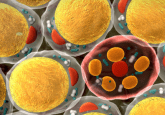Sleep deprivation could increase risk of obesity

Researchers have demonstrated how sleep deprivation impairs normal lipid metabolism, which can increase obesity risk.
A bad night’s sleep is usually found to lower our mood and energy levels for the following day. However, chronic sleep deprivation can have much more harmful effects, including an increased risk of cardiometabolic disease.
Previous research has demonstrated how long-term sleep deprivation increases your risk of developing obesity and diabetes. However, the majority of these studies have focused solely on glucose metabolism.
Now, researchers at Pennsylvania State University (USA) have demonstrated how sleep deprivation alters participant’s lipid metabolism, which could contribute to the increased health risks.
The study, published recently in the Journal of Lipid Research, investigated the effects of restricting the sleep of 15 young, healthy, male participants to less than 5 hours for 4 consecutive nights, following a high-fat dinner.
Sleep deprivation decreased the majority of participant reported experiences of fullness and/or satisfaction after finishing their standardized, high-fat meal. Blood samples were then taken from all participants and comparisons showed that sleep deprivation resulted in decreased postprandial lipid levels in the blood.
- Could coffee be the key ingredient for weight loss?
- Human fat storage: how we became the ‘fat primate’
- Catching z’s to prevent heart disease
“The lipids weren’t evaporating – they were being stored,” explained Orefu Buxton, a professor at Pennsylvania State University and a senior author on this paper.
In order to test the impact of 1 night of recovery, participants were allowed 10 hours sleep before researchers ran the same tests again. They discovered that, although there was improvement in postprandial lipemia, the participants did not fully recover.
Whilst the study is limited by heavy controls, it still gives a fascinating insight into how dangerous sleep deprivation can be. According to the results, when we get less sleep, we get hungrier faster, so eat more and then our body stores more fat.
“This study’s importance relies on its translational relevance. A high-fat meal in the evening, at dinnertime – and real food, not something infused into the vein? That’s a typical exposure. That’s very American,” concluded Buxton.




